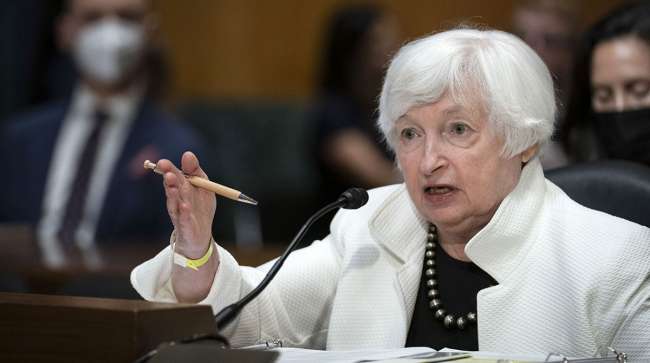Yellen Touts ‘Friend-Shoring’ as Global Supply Chain Fix

[Stay on top of transportation news: Get TTNews in your inbox.]
U.S. Treasury Secretary Janet Yellen called on “trusted” U.S. allies to strengthen trade relationships to shore up global supply chains disrupted by the pandemic, worsened by Russia’s war in Ukraine and threatened longer term by a reliance on China.
In her longest public address during a three-stop tour of East Asia, Yellen touted her “friend-shoring” concept as a way to reduce the vulnerabilities of a supply system badly strained over the past two years, and as a mechanism for reducing inflation in the U.S. and elsewhere.
“Friend-shoring is about deepening relationships and diversifying our supply chains with a greater number of trusted partners to lower risks for our economy and theirs,” Yellen said, in a speech delivered June 19 at a research-and-development facility in Seoul run by South Korean conglomerate LG.
“In so doing, we can help to insulate both American and Korean households from the price increases and disruptions caused by geopolitical and economic risks,” she said.
Talks over supply chains come as South Korea’s relations with China become increasingly competitive in global commerce. China has the strongest correlation with South Korea in Asia when it comes to the similarity of their products sold abroad.
That’s because the world’s second biggest economy is growing more technologically independent while becoming less reliant on supplies from its neighbor, the Korea Trade-Investment Promotion Agency said in a report earlier in July.
LG Energy Solution and LG Chem already have plans to invest at least $11 billion in the U.S. by 2025, said Shin Hak-Cheol, chief executive at LG Chem, at the joint press conference with Yellen.
Want more news? Listen to today's daily briefing above or go here for more info
Globally, including in the U.S., LG Chem will spend $4.5 billion on developing diverse materials used for batteries, such as cathode-active materials, separators and carbon nanotubes, Shin added.
The Treasury chief singled out China, which has come in for increasing criticism from the Biden administration over a number of issues, as a country on which the U.S. and others should be less reliant.
“We cannot allow countries like China to use their market positions in key raw materials, technologies or products to disrupt our economy or exercise unwanted geopolitical leverage,” she said.
While in Tokyo last week, she also castigated Beijing for failing to coordinate with other major creditors to help heavily indebted countries, like Sri Lanka, that are struggling with a slowing global economy, high inflation and a strengthening dollar.
Yellen also met July 19 with South Korean President Yoon Suk Yeol, Finance Minister Choo Kyung-ho and Rhee Chang-yong, governor of the Bank of Korea. Yoon said Yellen’s visit demonstrates expanding economic alliance with the U.S., while Choo said that the global economic situation that the two countries are facing is becoming increasingly grave.
The Treasury secretary also met a group of female entrepreneurs to discuss expanding opportunities for women in the Korean economy.
Yellen traveled to Seoul after attending a gathering of finance ministers from the Group of 20 leading economies. She began her 10-day journey, her first to Asia as head of the Treasury, with a stop in Tokyo.

